Coping with PTSD (Post Traumatic Stress Disorder) since the Vietnam War and more recently with the death of a beloved pet, an Army veteran finds mutual healing with a shelter dog beset by separation anxiety.
Army strong for nearly 20 years
George decided to enlist in the Army when the draft started for the Vietnam War. He was a combat engineer and demolition expert and, after serving three years in Germany, decided to reenlist. Shortly thereafter he began studying computers and completed four tours of duty in Korea as a computer operator.
Sadly, George was no stranger to the horrors of war. While in Korea and during Operation Paul Bunyan, George witnessed the death of his captain when their crew came under a brutal attack. 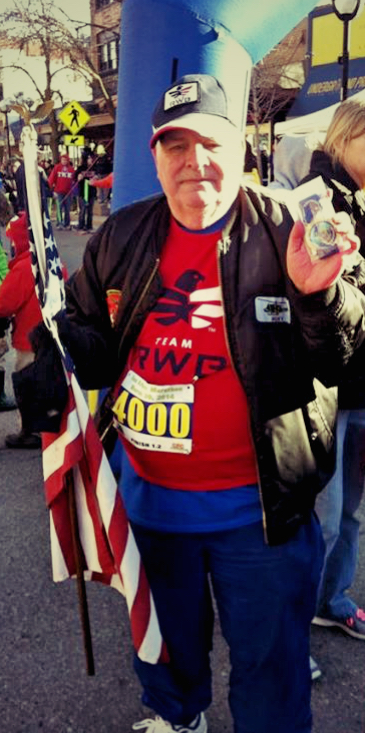
During his fourth tour of duty George was notified that they had too many computer operators, forcing the veteran to rethink his military career path. This unexpected twist led George to become a gunner on a Huey, a type of military helicopter. It was during this time that George received a distress call from a group of Marines who had fallen victim to friendly fire. Immediately, George and his crew went to help in any way they could. He describes the experience as being very traumatizing for him and all those involved, an experience that still haunts him today.
After 13 years of active duty in the Army, George joined the National Guard as crew chief on a Black Hawk helicopter. His unit was involved in black ops, or specialized groups that carry out secret missions during military operations. During his time working these covert operations, George was called to aid in operations during 9/11, Desert Shield and Desert Storm, which included deployments to Saudi Arabia and Kuwait.
Despite losing many of his fellow soldiers during his thirteen years active duty in the Army and his six years in the National Guard, George insists that he would not change anything about his experience in the military.
“How do you reply to someone who says ‘thank you for your service?’” he asks, and answers: “’You’re welcome’ doesn’t sound appropriate. Say, ‘My pleasure.’”
Life after wartime
Toward the end of his enlistment with the National Guard and upon his return home, George recognized the need to share his life with someone. Through online dating sites he found one particular profile which caught his eye. Despite lacking a photograph, Patricia’s post intrigued the combat Army veteran: she wanted someone to teach her how to play golf.
George and Patricia exchanged a few emails before deciding to meet in person. Their first meeting took place at a park in Lansing, Michigan; the pair hit it off immediately. George admits that Patricia told him they would marry, but only after he found a job. He did, and in 2003 the couple wed.
A void that only a dog could fill
A few years ago, George and Patricia lost their beloved dog Coco, leaving them both feeling empty and with a gaping void in their lives. This emptiness seemed to hit George harder since he had been diagnosed with Post Traumatic Stress Disorder due to his military experiences. The Army veteran lives with the constant strain of anxiety, a common symptom of PTSD. George has endured years of PTSD-induced nightmares, even though his military career ended long ago.
“I have a hard time falling asleep in the dark,” George says. “Your subconscious would say you can’t go to sleep. You have to be alert, on guard duty.”
George got a lighted alarm clock to help him recognize that he is at home when he is trying to sleep at night, an effort meant to calm his mind and reduce anxiety. 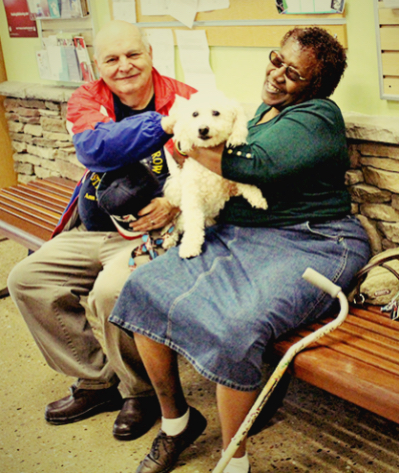
In addition to coping with PTSD, George was diagnosed with hypertension and instructed to lose weight by increasing his exercise level. Patricia needed a morale boost as well; as an amputee she often cannot go out due to complications with her prosthetics.
The couple’s health issues made them realize that something was lacking in their otherwise happy lives. A dog, to be exact.
Benefits of senior citizenry
George and Patricia started a search for the right dog to suit their needs, but were not having much luck; many shelters would not adopt to them because of their limitations. While running a table at an event for a non-profit veteran organization, George heard about Pets for Patriots, and learned how the nationally operating charity helps veterans and active duty service members adopt homeless dogs and cats most in need of adoption.
On June 6, 2014, only a short time after initially inquiring about the companion pet adoption program, George received an email from the Humane Society of the Huron Valley, which included a picture of a Bichon Frisee named Bobby.
George showed the picture to his wife Patricia, to which she quickly responded, “We have to go get him.”
The Humane Society of the Huron Valley is a Pets for Patriots adoption and veterinary partner, offering veterans through this partnership a 50% adoption fee discount and ongoing 10% discount at its full-service veterinary clinic. But since Bobby was a then ten year-old dog, and George and his wife are seniors, the adoption was free through the shelter’s Senior-to-Senior Adoptions program.
It was love at first sight when the couple met Bobby at the shelter, and since his adoption Bobby has adapted almost seamlessly to his new life. When it was time to leave the shelter the little dog jumped into the backseat of their car as though it was where he was meant to be all along. Once they got home, the pair introduced him to the entire neighborhood and Bobby quickly became a celebrity to the local children, who are always looking for an opportunity to play with him. Being a good sport, Bobby obliges.
Of love and healing
Since bringing Bobby home, George and Patricia have noticed that the senior dog suffers from separation anxiety, getting noticeably anxious and upset when George leaves the house. Veteran and pet have forged such a tight bond that Bobby cannot stand to be away from George.
Understanding what it is like to live with anxiety, George is working to find a solution that does not involve medication – a reluctance that stems from his own dislike of having to take medicine daily. If anyone understands Bobby’s anxiety, it’s George.
Despite his separation anxiety, Bobby has had a profound and positive effect on his Army dad. Now that he’s getting more exercise, George has lost 30 pounds and lowered his blood pressure. Equally important, his PTSD-induced nightmares are almost completely gone – a very positive development that he credits to his new canine companion.
“[I’m] young at heart, like Bobby,” he says with a smile in his voice.
The Army veteran is embracing his new life with vigor, competing in marathons, acting as an unofficial ambassador for a favorite veterans’ organization, teaching the neighborhood children about astronomy and participating in Civil War re-enactments. Through it all, he is lifting the spirits of other veterans, and spending more and better quality time with his wife and family.
Companion pet adoption helped release George from the bonds of his PTSD by replacing it with a healthier one. The focus and dedication needed to help Bobby through his own anxieties has helped the Army veteran cope with his own.
Asked whether other veterans should consider companion pet adoption, George is firm.
“Definitely go ahead and do it. It’s really helpful to anybody. It helps with your blood pressure and your mood. It helps you to get out and exercise,” he says, but above all, “A pet has eternal love for you as long as you love him and take care of him.”
Learn more about our work creating life-saving bonds between veterans and companion pets.




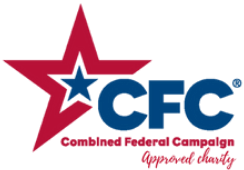

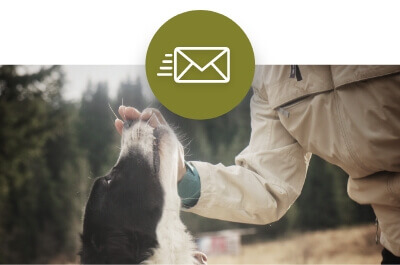



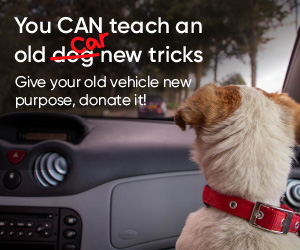
Really amazing story! Yeah, I agree, having pets around seems to be very comforting. Really nice article!
Thank you
Very inspiring story. Having pets around can really influence the well-being of your health, social structure and family life. Whether you own a pet for therapeutic reason or simply because you don’t know how to talk to other people, the perks of owning pets are abundant.
orthopedic specialist